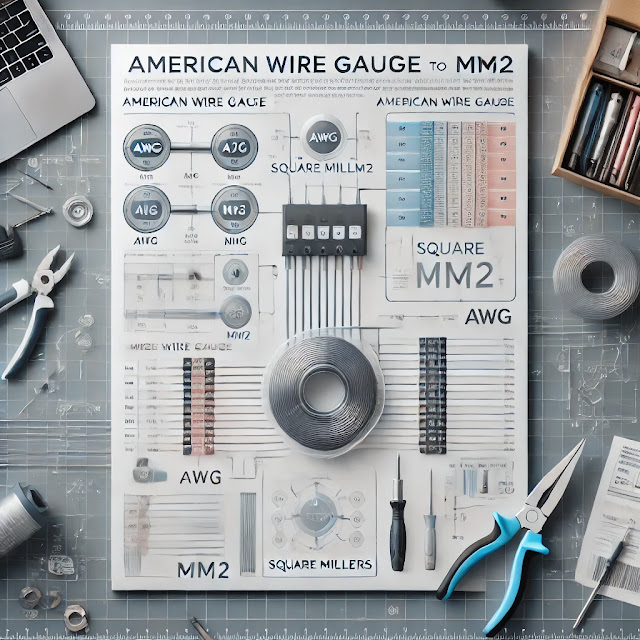
Understanding the relationship between wire gauge numbers (AWG) and their equivalent sizes in square millimeters (mm²) is essential for safe and efficient electrical work. The American Wire Gauge (AWG) system is widely used in the US, while mm² is the standard measurement in many other countries. This guide provides a clear comparison between these two systems, ensuring you select the correct wire size for your electrical projects.
Whether you work locally or sometimes you are involved in projects internationally, the ability to convert from AWG to mm² greatly simplifies your work and ensure that your language is global and universal if you are working with a team from different regions around the globe
American Wire Gauge (AWG) to mm² Conversion Table
| AWG (Gauge Number) | Diameter (mm) | Cross-Sectional Area (mm²) |
|---|---|---|
| 0000 (4/0) | 11.68 | 107.22 |
| 000 (3/0) | 10.40 | 85.03 |
| 00 (2/0) | 9.27 | 67.43 |
| 0 (1/0) | 8.25 | 53.49 |
| 1 | 7.35 | 42.41 |
| 2 | 6.54 | 33.62 |
| 3 | 5.83 | 26.67 |
| 4 | 5.19 | 21.15 |
| 5 | 4.62 | 16.77 |
| 6 | 4.11 | 13.30 |
| 7 | 3.67 | 10.55 |
| 8 | 3.26 | 8.37 |
| 9 | 2.91 | 6.63 |
| 10 | 2.59 | 5.26 |
| 12 | 2.05 | 3.31 |
| 14 | 1.63 | 2.08 |
| 16 | 1.29 | 1.31 |
| 18 | 1.02 | 0.823 |
| 20 | 0.81 | 0.517 |
| 22 | 0.64 | 0.326 |
| 24 | 0.51 | 0.205 |
| 26 | 0.40 | 0.129 |
| 28 | 0.32 | 0.0810 |
| 30 | 0.25 | 0.0509 |
How to Use
This Table
- Identify the AWG Size:
·
Check the wire’s insulation or refer to its
specifications to determine its AWG number.
- Match AWG to mm²:
·
Use the table above to find the corresponding
size in square millimeters (mm²).
- Ensure Compatibility:
·
Verify that the selected wire size meets the
requirements for the intended electrical load and complies with local codes.
Why
Converting Wire Sizes Matters
- Global Compatibility: Electrical projects often require adherence to international
standards, and knowing both AWG and mm² measurements ensures seamless
integration.
- Safety Assurance: Choosing the correct wire size minimizes the risk of overheating,
voltage drops, or fire hazards.
- Efficiency: Proper wire sizing reduces energy losses and ensures the longevity
of your electrical system.
Practical
Applications of AWG to mm² Conversion
- DIY Projects: Homeowners working on minor electrical repairs or upgrades.
- International Standards: Engineers and contractors managing projects that involve both AWG
and mm² specifications.
- Troubleshooting: Quickly identifying and replacing wires in mixed-standard systems.
Understanding
the conversion between wire gauge numbers and mm² sizes is crucial for anyone
involved in electrical work, whether it’s for residential, commercial, or
industrial projects. Use this guide as a quick reference to ensure your wiring
projects meet safety and performance standards.
